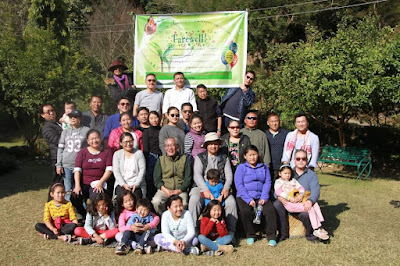It is the responsibility of those who work at the CTA to do our work to the best of our ability and this will serve an example for a new generation of young educated Tibetans who wish to serve in the Central Tibetan Administration. - Thubten Samphel, March 24, 2018.
As usual, today we had a regular meeting in the office at the foothill of Dhauladhar. It was a normal day and I did not expect any unexpected things to happen today. However, after the meeting, my colleagues instantly shared the news of the passing away of Kungoe Samphel la. I was shocked, saddened and in complete disbelief. Yesterday evening and for three consecutive days, I spoke with him over the phone and he seemed fine and shared his immediate plans. It was always good to speak to Kungoe Samphel la and be with his company.
Thubten Samphel la as we most fondly called him Kungoe Samphel la, was a true gentleman, a man of high principle and values. He was not just a civil servant, but a scholar and a prolific writer. His understanding of world history and particularly of the stature of Tibet connects his writings even to the common readers. He had authored couple of books, written scores of articles and book reviews in many national and international medias. The most liked one was his ‘Dharamsala Diary’ which he passionately wrote in the Tibet Bulletin for couple of years.
Throughout his youthful 40 years of services, he majorly dedicated his life to the Department of Information and International Relations of Central Tibetan Administration by initially working as the editor of the Tibetan Bulletin, and later as the Information Secretary. He then worked as the director of the then newly established Tibet Policy Institute, an in house think tank of the Central Tibetan Administration for 7 long years. With profound knowledge and wisdom, his words were sharp and precise while attending queries when he served as the official spokesperson of the Central Tibetan Administration.
I am amongst the fortunate one who got a chance to work under his guidance, supervision and mentorship for many years and later became his deputy at the Tibet Policy Institute til the end of his formal service. Even after his retirement, he was more than ever ready to help the Institute in any capacities. I am grateful to Kungoe Samphel la for his unflinching trust upon me for all these years.
Like many of my colleagues, I have learnt many things from Kungoe Samphel la that makes me what I am now. His selfless dedication and services were supreme and exemplary. He normally uttered little words, which were meaningful and inspiring, on top of that, his down to earth personality speaks volume about his humility.
Kungoe Samphel la as a scholar, If I may confess does not bother much about bureaucracy, neither cared much about its complexity. However, he had a reputation of being a kindhearted leader, administrator and a perfect mentor who is loved and respected by all.
At the Tibet Policy Institute, he was like a father figure to all of us. We had many dinners and discussions at night at his residence. His sacrifice and dedication set a benchmark for me to rise and follow his leadership. He was a patriot and his loyalty to His Holiness the Dalai Lama, Central Tibetan Administration and the Tibetan people are pure and genuine. His passion for writing on Tibet continues even after his retirement. In fact, he devoted much of time in writings and had few ongoing writing projects.
On 4 June, he silently left this mortal world in the wee hours without pain and health complications. Adios to my mentor Kungoe Samphel la and may you be blessed by Triple Jem and be born again to inspire many more with your humility and wisdom. My heartfelt condolences and grievances to his family members and friends.





